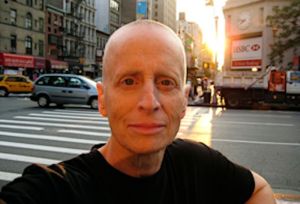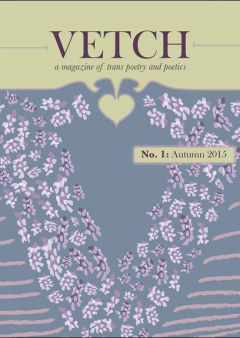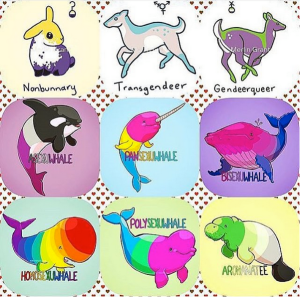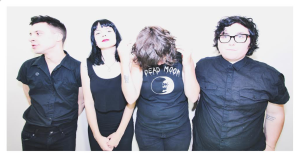The following photo and article are reposted from Jezebel.com. The original article can be found here.

On November 15th, Leslie Feinberg died a communist, a class warrior, a ground-breaking activist for trans liberation, an anti-racist, and a lifelong champion for social justice at home and abroad.
In life, Feinberg was best known for her* first and most famous book, the novel Stone Butch Blues, in which the protagonist, Jess, a working-class butch in upstate New York, fights to find her place in the world. In stark, clear language, Feinberg describes the brutality of homophobia and racism (“No one ever offered a name for what was wrong with me”) and the tenderness of love and loss (“Tonight I walked down streets looking for you in every woman’s face, as I have each night of this lonely exile”). The book has been called the great queer American novel, and translated into, among other languages, Slovenian, Hebrew and Chinese.
For me, the book, and Feinberg, have a more personal significance. She was one of my earliest role models, but it’s only now, in my mourning, that I realize just how deeply Feinberg’s life etched grooves into mine.
Like her, I grew up a misfit, mocked Jewish-American girl in upstate New York. I came across Stone Butch Blues in my middle teen years, just as I’d started to find the radical political community upon whom Feinberg had left a distinct mark. I don’t remember who gave me her book, but I remember reading it furtively between classes in a high school, my head ducked from bullying, my mind still reeling from the unexpected death of my abusive mother.
In the novel, Jess is violated, beaten, fired from jobs, and marginalized on nearly every page. But through this and not in spite of it, Jess learns lessons of solidarity that she applies in her home, on the factory floor, and in the street. I read Stone Butch Blues at a point when my mind was howling with fear and hate, and Feinberg taught me through it that a life of authenticity and community is possible without the family or social approval that I, as a teenager, still craved.
I learned more politics from Feinberg’s example than I ever did from any tract or book of theory. When I attended Antioch College, the student body organized in support of radical black journalist Mumia Abu Jamal, who had been sentenced to death for the murder of a Philadelphia police officer after a trial that, according to Amnesty International, failed to meet international standards. We voted that he would be our commencement speaker.
In the weeks leading up to the April 2000 commencement, we found ourselves in the middle of protests, harassment and death threats; a neo-Nazi group slipped hate literature into mailboxes around our college town. On the day of the commencement, we were tense, and security was on high alert. Of course, the condemned Mumia could not be present in person, and recorded speech arrived in the hand of Leslie Feinberg.
Introducing him, as a representative of the LGBT group Rainbow Flags for Mumia, Feinberg faced the task of explaining him to our families. She placed his story in the context of the poverty, racism and police violence of the Philadelphia where Mumia had lived and written. She drew comparisons between Mumia and the 1930s case of the Scottsboro Brothers, nine black brothers accused falsely of rape and condemned to hang; a communist-led mass campaign, involving everyone from trade unionists to celebrities, is what won them the appeal that freed them. And then, she played the tape. To students and graduates, Mumia was a symbol of struggle against injustice, but it was Feinberg, the supporter and the bridge builder, who inspired my future path.
Feinberg built many bridges, as a speaker and a writer. When she was well, she travelled widely, and wrote journalism, polemic, fiction and history at a relentless pace. She interviewed other activists about Stonewall; she reported onthe personal tragedies of migrant workers for the Workers World newspaper, where she worked as managing editor. In her books Beyond Pink and Blue andTransgender Warriors she situated the struggles of trans people within the context of capitalism. She put it simply in Transgender Warriors: “I don’t own property, a business, or a factory, so I don’t live off other people’s labor. I have to work for wages or I’d starve. But since I’m gender-ambiguous, it’s almost impossible for me to get a job.”
She believed strongly that the oppression of LGBT people is intimately linked with war, racism, poverty and the other ills of capitalism. At a conference on building a progressive LGBT movement, she said, “I do not believe that our sexuality, gender expression and bodies can be liberated without making a ferocious mobilization against imperialist war and racism an integral part of our struggle. The degree to which any movement is progressive or revolutionary is measured by its independence from the rulers of the society it seeks to change. Are war and racism “gay” or “trans” issues? That’s an old argument in our movement. And how it has been answered has signaled whether the movement collapsed or gained new vitality.”
Despite the steadiness of her convictions, in many ways, Feinberg’s life was an uncertain one. She worked temporary jobs involving heavy and menial labour, and she was estranged from a family that did not accept her gender expression and sexual identity. She turned these experiences into a relentless stream of activist and scholarly work that bridged the differences between groups, helping a generation of radicals learn the nuances of building solidarity. Even as the complications of Lyme Disease devastated her body, Feinberg was arrested in 2012 for protesting the incarceration of CeCe McDonald, a trans woman of colour who had been thrown into jail for resisting a transphobic and racist attack outside a Minneapolis bar. As she got sicker, she annotated and referenced her work for scholars.
Her life and work inspired me to set aside the weight of religion and family ambitions; she taught me that a life dedicated to the struggles of others still holds room for personal fulfillment and growth. She also inspired my work as a political writer. As I tell the story of sex workers campaigning for our rights, a fight deeply connected to the struggles for class, racial and gender equality, I remember her. When I share my sorrows and joys with a family I chose rather than my family of origin, I remember her too.
Feinberg died on the eve of Stone Butch Blues’ twentieth anniversary, as she was preparing a new edition of the book. Her last words, according to the Advocate, were, “Remember me as a revolutionary communist.” She knew, doubtlessly, that contemporary social movements still bear many of the rifts she fought to close. In 2006, she exhorted LGBT activists to stand up against police violence in communities of colour:
Frederick Douglass said it best: “Without struggle, there is no progress.” And solidarity is what unites us in struggle.
Those who fought the police at the 1966 Compton’s Cafeteria Rebellion and the 1969 Stonewall Uprising knew that in their bones. Asian and Latin@, Black and white, trans and gay, lesbian and bi—when they united against a common enemy, they gathered the storm clouds of their power.
We need to gather our power today.
The only way to honor Feinberg in death is to strengthen the bridges she spent her life building. Hers was a vision of social change shaped by the world’s most oppressed people, gathering power they lacked individually in solidarity with each other. Today, this seems—more than ever—like the only way forward.
*Although Feinberg often used the pronouns hir/zhe, or his/he, the Advocate obituary written by her bereaved wife and family used her/she; I have respected that here.
Margaret Corvid is a writer, activist and professional dominatrix living in the South West of England. She blogs regularly at the New Statesman and has appeared recently in The Guardian, xoJane and The Frisky. More of her work can be found at Sordid.org.uk.
Image taken by Leslie Feinberg.
The book referenced in this article has been made available to download for free in pdf format. Get it here: Stone Butch Blues pdf.



